I’m on a mission with my new Hack Your Muse initiative to help writers write when they want, how they want, what they want:
Kelly McClymer Books
Kelly McClymer is a USA Today Bestselling Author of historical romance, cozy mystery, and YA fantasy. She has been writing for forty years and has taught writing for fifteen years.
I’m on a mission with my new Hack Your Muse initiative to help writers write when they want, how they want, what they want:
Are you a sucker for oral storytelling?
Me too. I love the MOTH Radio Hour on NPR. Love it.
So, when I was visiting in the Bay Area, looking for somewhere to take my sister to repay her hospitality, I saw there was a MOTH Story Slam. No brainer. I got the tickets.
My sister is aware that, quiet and unassuming as I usually am, I sometimes do daring things.
Getting on a stage in front of a packed theatre and telling a story in 5 minutes or less is…daring.
My sister asked if I planned to tell a story.
I shrugged. Said, “I don’t know.” Because…scary.
Did I mention there are rules to a Story Slam? No notes. Has to be on a theme (this one was Wonders). Done at 5 minute mark whether you’ve finished the story or not.
BUT…I had been writing at a little coffee shop in Point Richmond (Kaleidoscope, stop in if you are ever nearby). The owner/manager was retelling fairytales to hone her oral storytelling skill. It just so happened that she told one of these stories on a night when I was thinking about how to tell one if I found the courage to get up on stage at the Moth Story Slam.
She set a wonderful example for what I’d need to do to tell my story well: lots of pauses (the equivalent of white space for novelists like me), hand gestures (like punctuation), and room for audience reaction (scene break!). Seriously — if you are ever in the area, GO. Amazing. And good coffee, too.
So I walked along the Bay, and in the park (I like to walk a lot when I’m in the Bay Area), and I told the story to myself. I chose one I’d told a lot, to others, over the years. But 5 minutes is not as long as you’d think, and I’m a novelist, so…I pared and cut and scraped away all embellishments to this story. And there were many.
Finally, I had a shape I could remember (no NOTES!!!). I had built in room for pauses and audience reaction.
We got to the theatre and sat down. You had to go up front to fill in a form if you wanted to tell a story. They would only pick ten.
My sister looked at me. “Are you going to sign up?”
“Might as well.” I acted casual, as if I hadn’t been practicing and obsessing over this story. I filled in the card and put it in the hands of fate whether I would tell my story on stage or not.
I sat back and enjoyed the storytelling of the first few participants, pushing down the butterflies every time my name was NOT called.
And then my name was called.
And I told my story, with the pauses, and hand gestures, and in under 5 minutes.
Did I mention that the audience grades you? Yep. I didn’t know that either. I got a 9 out of 10, so I couldn’t complain. I didn’t win (did I forget to mention there is a winner, who gets invited to a bigger StorySlam?). I wouldn’t have been able to participate in the bigger StorySlam because I was headed home, so I didn’t mind. I’d won all I needed with the opportunity to tell my story to an audience, and hear them laugh and gasp exactly where I wanted them to.
If you’re curious, you can listen to it below.

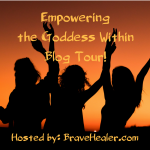 This post is part of the Empowering the Goddess Within Blog Tour hosted by www.BraveHealer.com.
This post is part of the Empowering the Goddess Within Blog Tour hosted by www.BraveHealer.com.
Do you hesitatingly set ambitious goals for yourself every now again?
Me too.
About a decade ago, after I’d published ten novels, I began to look very hard at how to write a bestseller. It seemed like a reasonable ambition, not too much for a busy mom of three with a day job. After all, in my experience, novels are written in neglected, cobwebby corners of the day between dusk and dawn. No harm, no foul if I didn’t succeed. No one would even know what I was doing unless I succeeded.
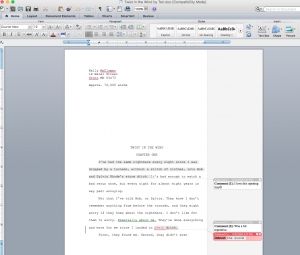 I had an idea I already liked, called (at the time) Twist in the Wind. It was a fantasy about a girl who could read thought dust (the leftover thoughts someone left after they touched someone). I’d written three chapters, and sent it to writer-friends for evaluation. They liked it, but…it was missing something that might make it a bestseller contender.
I had an idea I already liked, called (at the time) Twist in the Wind. It was a fantasy about a girl who could read thought dust (the leftover thoughts someone left after they touched someone). I’d written three chapters, and sent it to writer-friends for evaluation. They liked it, but…it was missing something that might make it a bestseller contender.
I researched the bestselling fantasy books at the time and noticed there were a lot of mythic and fairytale connections. Cool. I liked myth. I liked fairytales (my first historical romance was titled The Fairy Tale Bride, after all 🙂
But I didn’t want to use just any old myth or fairytale. No. I wanted to go somewhere not too many people had gone. So I looked to see where the oldest fairytales may have originated. I settled on Baba Yaga. There isn’t much about her with that name, but when you immerse yourself in fairytales and female myth, you quickly see that Baba Yaga is in every goddess, fairy godmother…and evil witch…in the most compelling fairytales and mythic stories.
So I started revising my simple Twist in the Wind. And rewriting. And plotting and planning and outlining. Ten years, yo.
The story world grew into a trilogy. And then a trilogy of trilogies. And then a set of seven serializations. With a companion 1,000 short stories. All set in the EverTwixt world.
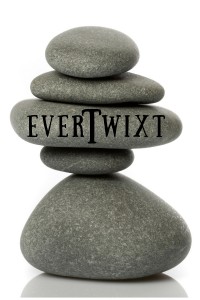 EverTwixt was an official thing — but it was unleashed only in my computer, myriad notebooks, and my head. I didn’t see how I could ever unleash it out into the world. What had I done? This was too ambitious.
EverTwixt was an official thing — but it was unleashed only in my computer, myriad notebooks, and my head. I didn’t see how I could ever unleash it out into the world. What had I done? This was too ambitious.
I tried to stuff everything I’d unleashed back into a neat trilogy-shaped box. But, like Pandora, I couldn’t.
Belatedly, I realized I had awoken my Inner Wild Goddess. And she looked, sounded, and acted, a whole like Baba Yaga.
The breadth and scope of my idea began to confound me. Something like this can’t be written in the cobwebbed corners of the day. “I can’t do this, find someone else,” I pleaded with Baba Yaga.
The wild goddess blew a cold wind on my neck and haunted my nightmares. “Your quest is hardly begun. You need companions to keep your will strong. Have you learned nothing from all the myth and fairy tales I’ve sent you to guide you on your way?”
Obediently, with no idea how to do what she was asking me (writers write alone, for the most part), I reached out to find readers who might want to play in my world early on and help propel me through the dense fabric of the world I was creating from the strongest but most gossamer of story threads.
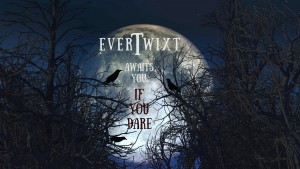 I built an EverTwixt website and put up the first couple of episodes for free download. No one came.
I built an EverTwixt website and put up the first couple of episodes for free download. No one came.
Once again, I told Baba Yaga that I wasn’t up to the task. She laughed her weird, wild laugh and taunted me. “Did Cinderella make her dreams come true by staying home when I gave her what she needed to enjoy the ball?” she asked me. “You’ll have to leave your cobwebby corners and venture out into the wild of the world if you want to succeed at your quest.”
So I ventured out and began to pick up allies who had skills I did not. I joined a business accelerator program and learned what skills I would have to learn in order to create a stable, sustainable site. I joined a mastermind group to find allies who had woken their Inner Wild Goddesses and wanted to change the world as well. I talked to random readers and writers about my idea. I experimented with different marketing tactics and techniques to find the ones that might work for me.
I was proud of all that I had learned, even though I put little of it to practical use. Just like all the epic questers before me, I had gathered allies and knowledge about how to succeed. I had won — and lost — small battles along the way. I was epic. I was awesome. I was…
Baba Yaga laughed at me again. “You still have to launch to the world, you know. Only time will tell you if you will succeed in your quest.”
“I’m not ready,” I explained to her. “First, I’m going to create the most epic reader site ever known to readerkind, and then I’ll know enough to launch EverTwixt properly.”
Baba Yaga shook her finger at me. “You owe me. I whispered the truth to you until it became a fire in your veins. You must let it burn free, come what may.”
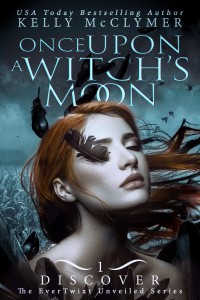 EverTwixt is about to relaunch, with all that I’ve learned so far. It will be a soft launch because it turns out my Inner Wild Goddess has much bigger plans for me. She’s happy to let EverTwixt grow like a wild-seeded garden over time. Turns out my next big quest is to create that epic reader site with some very strong allies.
EverTwixt is about to relaunch, with all that I’ve learned so far. It will be a soft launch because it turns out my Inner Wild Goddess has much bigger plans for me. She’s happy to let EverTwixt grow like a wild-seeded garden over time. Turns out my next big quest is to create that epic reader site with some very strong allies.
But to do that, I have to let the seeds and early blossoms of EverTwixt free to spread themselves, however slowly.
My Inner Wild Goddess tricked me out of my cobwebby corner with a simple ambition, but I forgive her. I’ve met so many awesome allies along the way. I know there are more to come. Maybe my quest’s epic journey will not end with a bestseller. But maybe that was the only ambition Baba Yaga could hold out to pry me out of my cobwebby corner.
And now that I’m out…I’m not going back in.
Me neither. But my dad did.
My father was born in the early ’30s, and hospitals had actually improved quite a bit (thanks to the Victorian heroine you will meet in this post). But his parents, and myriad aunts and uncles had been born in a time when you would rather cut your own gangrenous arm off at home than go to the hospital and die. The reality began to change in Victorian times, but it was a slow revolution until medical science matured around the time my father was born.
Last year, I fell down the stairs. I broke my wrist and needed surgery. I did not want to go to the hosital, but I didn’t have major concerns that I was going to die there. I just wanted to wish away the whole broken wrist (you know I write fantasy as well as historical romance, right?).
Everytime I go into the hospital, I remember my father’s attitude toward hospitals – that they were places people went to die. He said it often enough. He knew better, but the lessons he had learned as a young boy in the ’30s stuck with him underneath his modern understanding that a hospital saved his life (twice).
For the Victorians, hospitals were not places of healing, as we know them today.
They were teeming with disease, infection and death.
Florence Nightingale, a true Victorian heroine, helped to change all of that. Having been influenced at an early age by Parisian Mary Clarke that women were equal to men, Florence dared to follow her calling.
Yes, really. Despite what we are often told, women did not wait to start changing the world until they got the vote.
Even more daringly, she did this during the Crimean war. She became known as “the Lady with the Lamp.” But Florence used more than her caretaker skills to save the lives of soldiers who had been injured. She used her powerful writing, speaking, and science itself to revolutionize medicine to value and prioritize clean conditions and good hygiene in treating wounded soldiers — and all the unfortunate souls injured badly enough they required hospital care.
Like my dad with his triple bypass, and colon cancer.
Like me when my wrist was broken and I needed surgery.
We sometimes have a tendency to overlook how influential women in the 1800s were, despite the restrictions they had. But all the rights and freedoms we have in the law today are the result of women who defied the law and convention to change the world. Florence Nightingale was born to a wealthy, educated family. She was born to marry well and raise sons who wold contribute to society.
Instead, she chose to change the world in her own right.
My father- and I-have a lot to thank her for. You can read more about her, if you’re intrigued, in a new biography of Florence Nightingale: Florence Nightingale, The Courageous Life of the Legendary Nurse, by Catherine Reef. You can buy it at Amazon, Barnes and Noble, iBooks, Kobo, or Google Play.
What about you? Do you have a hospital story that involved a courageous and compassionate nurse?

Welcome to the Glass Slipper Sisters Beach Reads Bundle Sale! All ten of the below titles are available at Amazon and other retailers for just 99 cents each from July 24-28. Then the pumpkin carriage turns back into a pumpkin. Some of these books have never gone down this low before, and you won’t see a deal like this again for quite a while. So, load up your e-readers this summer with some royal fairy tale reads.

Amazon * Barnes & Noble * iBookstore *Kobo

Please note that book one in this series is free at retailers. Here is the Amazon link.
Book 2: Amazon * Barnes & Noble * iBookstore * Kobo * Google Play


![Pageflex Persona [document: PRS0000039_00070]](https://glassslippersisters.files.wordpress.com/2017/07/champion_200x300.jpg)

iBooks Kobo Barnes & Noble Google Play Amazon

Amazon * Barnes & Noble * iBookstore * Kobo * Smashwords

Atlantis Red Tide

Please note that book one in this series is free at retailers. Here is the Amazon link.
Book 2: Amazon * Barnes & Noble * iBookstore * Kobo * Google Play
Ray Bradbury has been quoted as saying, “I’m not in control of my muse. My muse does all the work.”
William S. Burroughs advised, “So cheat your landlord if you can and must, but do not try to shortchange the Muse. It cannot be done. You can’t fake quality.”
I know many writers shake their heads at the fanciful idea of a muse. They are motivated by the payment they expect for the work they produce. Some prop up bills to keep themselves writing.
That’s not me. And it is not many other writers I have had the privilege to meet along the writing path.
For me, writing requires an inner stillness. A listening for things that others cannot hear. These things are not random, though they may seem so at first. When I listen carefully, the things begin to chain together and make up a story for me to tell.
I do believe I have a muse, and that she comes when I reach that point of stillness that makes me ready to write the story of all these chained things that only I can hear. I don’t know whether the muse is intuition, insight, a gift from the gods, or a goddess in her own right. I don’t care, because I love my time with my muse and I have, over the three decades I’ve been writing, tried many things to lure her to me.
I have hacked my muse shamelessly over the years, by:
I have never gotten her drunk, though the more famous writers seem to have used mind-altering substances to help them call the muse. But those writers didn’t have normal family lives, or stay married to one spouse for decades, either. I’m a wife, a mom, a granny. I don’t just want to write, I want to change the world. I can’t afford the indulgence of drunk-writing with the muse. I don’t think she minds. But sometimes I wonder. If I did… What would happen?
In all my years of hacking my muse, I noticed something important only recently — my muse stops responding when I try to cheat her. Or, more properly, try to cheat the story that only I can hear. My muse allows no shortcuts or shortsheeting in the storytelling. I need to know why my characters do things, even if these things make no sense at all, or are not an important part of the story I think I’m telling.
My muse, on the other hand, doesn’t mind being hacked. In fact, I think she likes it when I begin a new ritual or try a new writing spot or technique. She tends to come quickly when I call her that way (rather than call her with the futile fishwife bleat of desperation that lacks all respect for the stillness).
Hacking has an element of respect built into it that cheating does not. And I respect my muse. She has brought me more stories than I’ll likely ever be able to tell in my lifetime. And still, I don’t know her as well as I’d like.
Recently, my muse revealed her name to me: Baba Yaga. Considering that I’m writing a huge fantasy series built around Baba Yaga and her home EverTwixt, you’d think that would have been obvious to me… oh, about ten years ago. But no. She didn’t reveal her name to me until I decided to play around with PlayBuzz and make a fun quiz for writers who might be interested in taking my “Hack Your Muse: Finish Your Novel in Eight Weeks” course.
What’s your muse’s name? Take the quiz and you just may find out.
If you really want to get to know your muse, try Meet Your Muse.